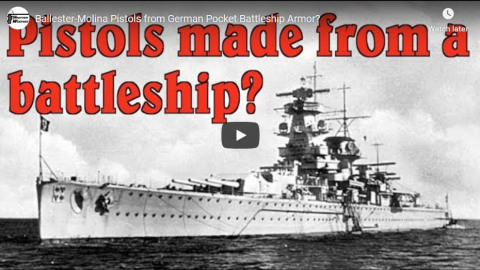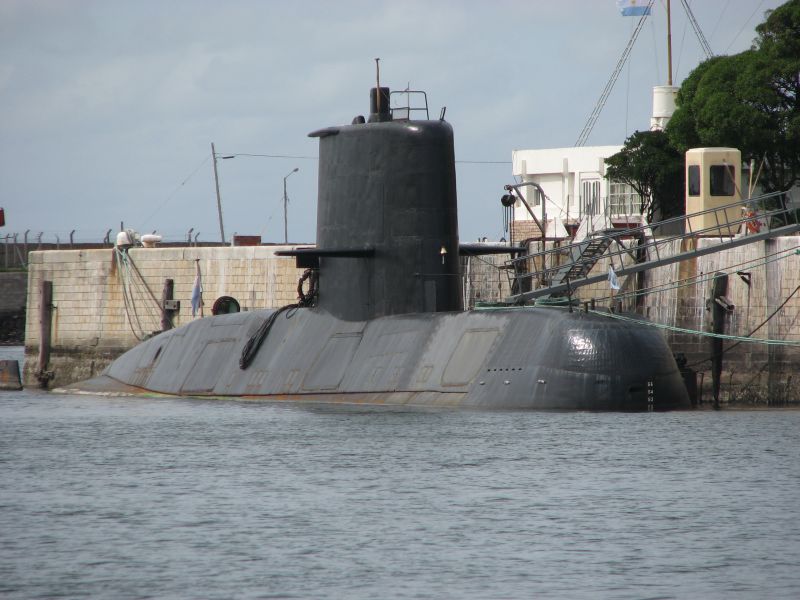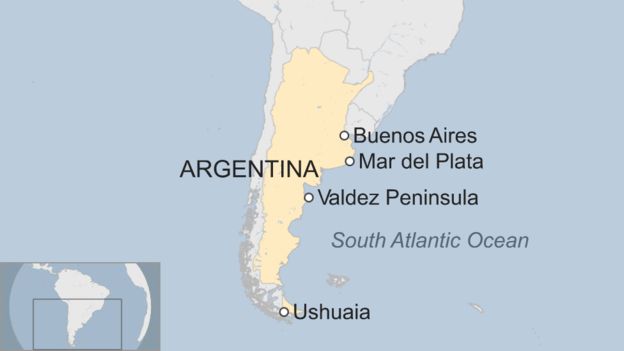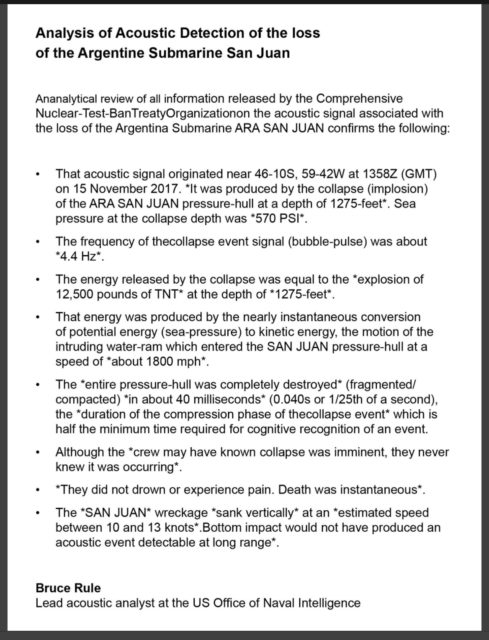Margaret Thatcher had a great deal of time for Andrew Lloyd Webber. In August 1978, while she was still Leader of the Opposition, her speechwriter Ronnie Millar took her to see Evita. “It was a strangely wondrous evening yesterday leaving so much to think about,” she wrote to Millar the next day. “I still find myself rather disturbed by it. But if they [the Peronists] can do that without any ideals, then if we apply the same perfection and creativeness to our message, we should provide quite good historic material for an opera called Margaret in thirty years’ time!”
Dominic Sandbrook, The Great British Dream Factory, 2015.
July 29, 2021
QotD: An opera called Margaret
March 17, 2021
Sunny Beaches, Fascist Leaders, and Nazi Spies – WW2 – Spies & Ties 01
World War Two
Published 16 Mar 2021South America is home to one of Germany’s most effective spy-networks. In Operation Bolivar, dozens of German operatives transmit information from and to the USA, Brazil, Argentina, and other South and Central American countries, giving the Abwehr and SD access to crucial information on politics, economics, and military business.
(more…)
May 22, 2020
Wehrmacht Wages, Argentina in WW2, and Otto von Habsburg – WW2 – OOTF 012
World War Two
Published 21 May 2020You’re just an average German doing your work when suddenly you’re called up for service and asked to put your life on the line for your country. But how does your country repay you? Find out today as we take a look at the regular German soldier’s salary, the political turmoil in Argentina during the war and the former powerhouse of Europe: the mighty Habsburg dynasty.
Join us on Patreon: https://www.patreon.com/TimeGhostHistory
Or join The TimeGhost Army directly at: https://timeghost.tvFollow WW2 day by day on Instagram @World_war_two_realtime https://www.instagram.com/world_war_t…
Between 2 Wars: https://www.youtube.com/playlist?list…
Source list: http://bit.ly/WW2sourcesHosted by: Indy Neidell
Written by: Isabel Wilson and Sietse Kenter
Director: Astrid Deinhard
Producers: Astrid Deinhard and Spartacus Olsson
Executive Producers: Astrid Deinhard, Indy Neidell, Spartacus Olsson, Bodo Rittenauer
Creative Producer: Joram Appel
Post-Production Director: Wieke Kapteijns
Research by: Isabel Wilson and Sietse Kenter
Edited by: Mikołaj Cackowski
Sound design: Marek Kamiński
Map animations: Eastory (https://www.youtube.com/c/eastory)Colorizations by:
Carlos Ortega Pereira, BlauColorizations – https://www.instagram.com/blaucoloriz…
Norman Stewart – https://oldtimesincolor.blogspot.com/
Adrien Fillon – https://www.instagram.com/adrien.colo…Sources:
Bundesarchiv
IWM CH 11432
Wehrmacht Private, Sergeant and Colonel insignia, courtesy Skjolbro, Wikimedia Commons
Wehrmacht General and Gefreiter insignia, courtesy F l a n k e r, Wikimedia Commons
Otto von Habsburg with his son Georg in European Parliament , courtesy Ferenc Csomafáy
Portrait of Otto von Habsburg, courtesy Oliver MarkSoundtracks from the Epidemic Sound:
Max Anson – “Ancient Saga”
Johannes Bornlof – “Deviation In Time”
Johannes Bornlof – “The Inspector 4”Archive by Screenocean/Reuters https://www.screenocean.com.
A TimeGhost chronological documentary produced by OnLion Entertainment GmbH.
February 21, 2020
“Back in Control” – The Falklands War – Sabaton History 055 [Official]
Sabaton History
Published 20 Feb 20201982, on a group of islands far, far away from Great Britain. After the military junta of Argentinian Army General Leopoldo Galtieri had publicly declared that the Falkland Islands (Malvinas) were rightfully part of Argentinian territory, an invasion force succeeded in wrestling control away from their British owners. However Great Britain would not simply stand by and give the Falklands up. Instead a British task-force would make its way down to the Falklands, in an attempt to take back control of the islands by force. What followed was an undeclared war of 10 weeks, where British carriers and commandos fought against the entrenched Argentinian ground-forces for the ownership of the islands.
Support Sabaton History on Patreon: https://www.patreon.com/sabatonhistory
Listen to “Back in Control” on the album Attero Dominatus:
CD: http://bit.ly/AtteroDominatusStore
Spotify: http://bit.ly/AtteroDominatusSpotify
Apple Music: http://bit.ly/AtteroDominatusAppleMusic
iTunes: http://bit.ly/AtteroDominatusiTunes
Amazon: http://bit.ly/AtteroDominatusAmzn
Google Play: http://bit.ly/AtteroDominatusGooglePlayCheck out the trailer for Sabaton’s new album ‘The Great War’ right here: https://www.youtube.com/watch?v=HCZP1…
Watch more videos on the Sabaton YouTube channel: https://www.youtube.com/user/Sabaton?…
Listen to Sabaton on Spotify: http://smarturl.it/SabatonSpotify
Official Sabaton Merchandise Shop: http://bit.ly/SabatonOfficialShopHosted by: Indy Neidell
Written by: Markus Linke and Indy Neidell
Directed by: Astrid Deinhard and Wieke Kapteijns
Produced by: Pär Sundström, Astrid Deinhard and Spartacus Olsson
Creative Producer: Joram Appel
Executive Producers: Pär Sundström, Joakim Broden, Tomas Sunmo, Indy Neidell, Astrid Deinhard, and Spartacus Olsson
Post-Production Director: Wieke Kapteijns
Edited by: Iryna Dulka
Sound Editing by: Marek Kaminski
Maps by: Eastory – https://www.youtube.com/c/eastoryArchive by: Reuters/Screenocean https://www.screenocean.com
Music by Sabaton.Sources:
– Casa Rosada (Argentina Presidency of the Nation)
– Gobierno de Argentina (Government of Argentina) – Argentina.gob.ar
– Ken Griffiths from Wikimedia Commons
– Armada Argentina on Flickr
– HMS Invincible in 1980, HMS Hermes in 1977, credit: Hugh Llewelyn on Flickr
– IWM: FKD 186, FKD 357, FKD 677, IWM FKD 138, FKD 185, FKD 2743, FKD 168, FKD 435, FKD 182, FKD 319, FKD 2744, FKD 71, FKD 217, FKD 107, FKD 321, FKD 349, FKD 345, FKD 2755, FKD 108, FKD 2028, FKD 2750, FKD 2051, FKD 2040, FKD 176, FKD 314, FKD 427
– IWM ART: 15530 33, 15530 56, 15530 10, 15530 10
– National Army Museum: 164752, 107649An OnLion Entertainment GmbH and Raging Beaver Publishing AB co-Production.
© Raging Beaver Publishing AB, 2019 – all rights reserved.
December 18, 2019
Ballester-Molina Pistols from German Pocket Battleship Armor?
Forgotten Weapons
Published 17 Dec 2019http://www.patreon.com/ForgottenWeapons
Cool Forgotten Weapons merch! http://shop.bbtv.com/collections/forg…
There is an old gun shop tale that Argentine Ballester-Molina pistols were made form the salvaged armor plate of the pocket battleship Admiral Graf Spee. The Graf Spee was scuttled in the Rio de la Plata estuary in December 1939, only a few miles from the HAFDASA factory in Buenos Aires, and Argentina did not have the domestic steel reserves to make enough pistols…
See Michael Parker’s full article on this, including the exact results of his metallurgical analysis, here:
https://www.americanrifleman.org/arti…
Contact:
Forgotten Weapons
6281 N. Oracle #36270
Tucson, AZ 85704
April 30, 2019
James May explains the time he nearly killed Jeremy Clarkson
DRIVETRIBE
Published on 31 Mar 2019With the Grand Tour trio having been on camera together for over 16 years now, you can forgive them for getting annoyed at each other every once in a while. James May tells us the story of a night in Argentina that put his friendship with Jeremy Clarkson to the test. One piece of advice for everyone out there – don’t let the fire go out.
December 22, 2018
Christmas Dishes From Around the World – Anglophenia Ep 44
Anglophenia
Published on 16 Dec 2015Join us for an international holiday feast, as Anglophenia’s Kate Arnell takes a look at several traditional Christmas dishes from around the world. Starting with the U.K., of course…
October 9, 2018
The Falklands – MiniWars #1
OverSimplified
Published on 22 Oct 2017“HEY OVERSIMPLIFIED, WHERE’S WW2?!”
Don’t worry, WW2 is still coming! Here’s a little something in the meantime!If you would like to see more OverSimplified on a more regular basis, please consider supporting me on Patreon (Patreon rewards coming soon):
https://www.patreon.com/OverSimple
September 8, 2018
British tabloids try to stir up trouble with Argentina … again
Sir Humphrey tries to talk the tabloid press in off the ledge over some terrible reporting from the Falkland Islands:
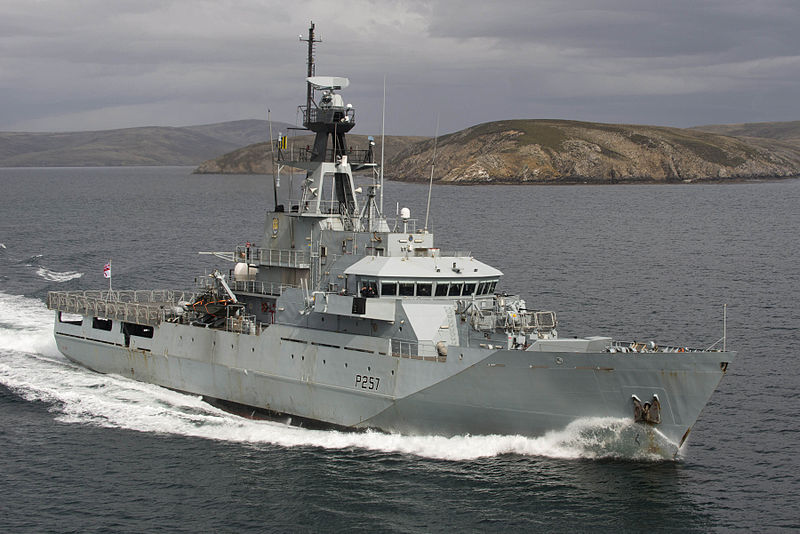
River Class Patrol Vessel HMS Clyde is pictured exercising at sea. HMS Clyde patrols the territorial seas and monitors the airspace around the Falkland Islands whilst conducting routine visits and reassurance to the many small settlements found throughout the islands.
Photo via Wikimedia Commons.
This week it was revealed that an Argentine survey vessel had been reported near the Falkland Islands, and that the local patrol ship HMS Clyde had reportedly been sent to investigate. This simple story led to a barrage of negative news suggesting that the RN had ‘confronted’ the vessel which was apparently looking for oil.
One of the greatest success stories in the last few years for British foreign policy has been the way a formerly tense and difficult relationship with Argentina has so rapidly been reset to become a genuinely productive one. Under the Kirchner regime, which used foreign policy gripes as a means of distracting attention from domestic woes, the relationship between Argentina and the UK was far less productive and strong than it could, or should, have been.
[…]
It is therefore immensely depressing to see some utter rubbish being spouted in the newspapers about what may or may not have happened off the Falkland Islands. The reality is far more simple than is being reported – the vessel in question was a scientific research ship conducting operations near the Burwood bank. Extremely bad weather forced a course change, which brought the vessel closer than planned to the Falkland Islands. (Full source can be found HERE).
The UK and Argentina operate a sensible arrangement to notify each other of movements in certain areas to reduce concerns and maintain effective communications. This agreement means that both nations provide 48hrs notice when a naval vessel will be within 15nm of the others coast line (noting territorial waters usually extend out to 12nm). Usually vessel movements and operational plans are known well in advance, and it is possible to communicate this in a timely fashion. Sometimes though, this doesn’t always go to plan – for instance when a vessel is changing course unexpectedly due to the weather.
On this occasion, it appears to have been the case that the Argentine authorities notified the UK of the vessels course and presence as soon as they were aware of its situation. The vessel herself is not one that is normally covered by these notification arrangements anyway (being a civilian research vessel).
What may have happened is that the UK may have identified an unknown vessel in the local area that they were not expecting to see (noting these waters are reasonably quiet) and began the process of sending HMS Clyde to investigate. As soon as it was clear that in fact this was an entirely legitimate presence, she returned to her normal duties. It is not even clear that HMS Clyde sailed, let alone went close to the Argentine vessel. As the Argentines themselves made clear, no overflight or challenge was made, and normal business continued as the weather improved.
November 19, 2017
Missing Argentine submarine may have been located (Updated)
The BBC is reporting some hope for the 44 crew members of the Argentine Navy submarine ARA San Juan, which went missing on a routine mission this week:
Signals have been detected that are thought to have come from an Argentine submarine that went missing with 44 crew on board, officials say.
The defence ministry is now trying to trace the location of the seven failed satellite calls received on Saturday.
[…]
The ARA San Juan was returning from a routine mission to Ushuaia, near the southern-most tip of South America, to its base at Mar del Plata, south of Buenos Aires.
Its last contact with the navy command was on Wednesday morning.
An Argentine destroyer and two corvettes are conducting a search around the area of the sub’s last known position off the south-eastern Valdez peninsula.
But so far there are no clues about its whereabouts.
It is thought that the submarine may have had communication difficulties caused by a power cut.
Navy protocol dictates that a vessel should come to the surface if communication has been lost.
Update, 31 January 2018: Earlier this month, CDR Salamander shared a graphic summarizing the US Office of Naval Intelligence acoustic detection analysis of the ARA San Juan:
Update, 19 November, 2018: The New York Daily News reports that the remains of the ARA San Juan have definitely been located about 700 miles east of Puerto Madryn at a depth of over 2800 feet.
An Argentine submarine that vanished with 44 crew members aboard was found at the bottom of the South Atlantic Ocean a year and a day after it disappeared, authorities said.
The wreckage of the ARA San Juan was located 2,850 feet deep, and about 700 miles east of the city of Puerto Madryn.
“It appears to be complete, but it obviously imploded,” Argentine naval Capt. Gabriel Attis told reporters, CNN reported, adding the sub’s hull was “totally deformed, collapsed and imploded.”
The [220]-foot vessel vanished off the coast of Argentina on Nov. 15, 2017, as it traveled back to its base in the coastal city of Mar Del Plata.
October 5, 2017
Four Reasons Financial Intermediaries Fail
Marginal Revolution University
Published on 26 Jul 2016As we’ve discussed in previous videos, financial intermediaries bridge savers and borrowers. When these bridges crumble, the effects can be disastrous. For businesses, credit shortages can lead to bankruptcy, or layoffs. For individuals, they rely on credit to invest in education or a new home or car. These negative effects show you how crucial intermediaries are to our lives.
Still, what exactly causes failed intermediation? Four answers:
First, insecure property rights. Simply speaking, when you save money at a bank, you expect the ability to pull out your funds when needed. But what if your deposits are frozen? Or confiscated altogether? For instance, in 2013 amidst a financial crisis, the government in Cyprus confiscated bank deposits to help pay down the country’s budget shortfall. You can see how insecure property rights can scare away potential savers.
Second, controls on interest rates. Interest rates are the price of borrowing. Thus, controls on interest rates, often called usury laws, are effectively price ceilings—they set the interest rate lower than the market equilibrium interest rate. With this forced lowering of interest rates, borrowers will want to borrow more, but lenders won’t want to lend. The effect? A lending shortage.
Third, politicized lending. Banks profit by assessing risk, and then loaning, based on that assessment. Banks that excel at assessment succeed. Those poor at it die out. Problems arise when the government intervenes to prop up failing banks, resulting in what we call “zombie banks.” In such cases, intervention undercuts normal competition, and intervention tends to favor banks that are politically connected. In fact, it’s been shown that there’s an inverse correlation between government ownership in banks and a country’s GDP per capita and productivity growth.
Fourth, you have runs, panics, and scandals. Remember, trust is vital to the financial system. When trust erodes, depositors may rush to withdraw their money from banks, causing what is known as a “bank run.” This can cause banks to fail, as we saw during the Great Depression. Scandals can also depress market confidence. Enron, WorldCom and Bernie Madoff may come to mind.
So, which of these four factors contributed to the Great Recession of 2008?
We’ll discuss that in our next video.
September 10, 2017
Special Air Service (SAS) – The Falklands Campaign
Published on 13 Jul 2016
Special Air Service (SAS) – The Falklands Conflict
When Argentina invaded the Falklands in April, 1982, Britain dispatched a large Naval Task Force to recapture the Falklands. Steaming south with the British fleet were D and G Squadron of the SAS, with supporting signals units.
September 7, 2017
Argentina expresses interest in laser death-beam-equipped USS Ponce
Those sneaky Argentines, trying to grab some surplus seagoing laser switchblade technology:

The U.S. Navy Afloat Forward Staging Base (Interim) USS Ponce (AFSB(I)-15) conducts an operational demonstration of the Office of Naval Research (ONR)-sponsored Laser Weapon System (LaWS) while deployed to the Arabian Gulf.
Date. 16 November 2014 (via Wikimedia)
Argentina reportedly wants to buy the US Navy’s laser death ray testbed warship, the fearsomely named USS Ponce.
According to the Mail on Sunday, the Argentinians are interested in buying the 46-year-old former landing platform (dock) from the American Navy when she is decommissioned next year.
“Senior Pentagon sources have confirmed talks are ongoing with the Argentinians over a Landing Platform Dock vessel capable of launching 800 troops, six helicopters and 2,000 tons of equipment into a war zone,” reported the paper, contrasting this with the Royal Navy’s HMS Ocean, which is very similar to the Ponce’s original configuration.
As regular readers know, the mighty Ponce has spent the last few years blasting various targets into bits using a shiny new $40m laser cannon and the US Navy even deployed her to the Gulf a few years ago.
To North American readers: if you’re wondering why this reads a bit oddly even by ordinary Register standards, it’s because the word “ponce” in British usage is a bit, um, odd. It’s taken as read that the primary purpose of an Argentine-flagged Ponce would sooner or later be intended for use in “liberating” the Falkland Islands:
The Ponce would be far from the first former US warship acquired by Argentina. In 1951 the Second World War cruiser USS Phoenix, a veteran of the Pearl Harbour attack by Japan, was bought by Argentina. She was renamed ARA General Belgrano – and sunk by British nuclear submarine HMS Conqueror during the 1982 Falklands War. Doubtless the same fate would befall the Ponce if Argentina tried the same trick again.
August 9, 2017
The Falklands War – A War for Lost Glory I THE COLD WAR
Published on 1 Jul 2015
The Falklands War was based on an old colonial struggle between two former world powers. When the military Junta in Argentina decided to claim the Falkland Islands in the South Atlantic they didn’t reckon with Great Britain’s Iron Lady Margaret Thatcher. The British Prime Minister unleashed full scale invasion. The Royal Navy and the British Army landed and ultimately took the capital Port Stanley. The Argentine Army surrendered shortly after that.
August 2, 2017
Argentina vs United Kingdom: Falklands War 2017
Published on 9 Dec 2016
How would Argentina fare if it tried to take the Falklands again? Does UK have enough forces stationed there to defend itself? Watch the video and find out!



